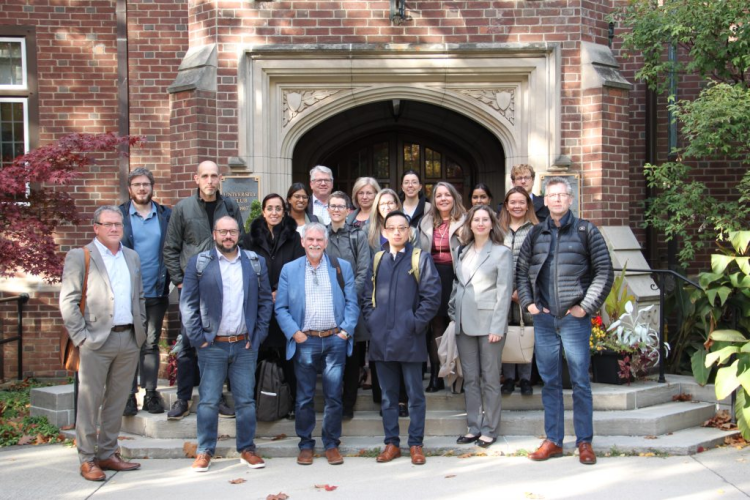The Canadian Pandemic Preparedness Hub (CP2H) convened a national strategy meeting at McMaster University last week, bringing together more than 100 of Canada's leading life sciences experts to discuss the future of biomanufacturing in the country.
Co-led by the University of Ottawa and McMaster, in partnership with the Ottawa Hospital, CP2H is one of five federally funded research hubs established to strengthen Canada's domestic biomanufacturing capacity and enhance pandemic preparedness.
Leaders from industry, academia, and government along with key partners from across the country met at the Oct. 29 conference at McMaster Innovation Park to participate in collaborative dialogue to chart a path toward a more resilient and self-sufficient Canadian biomanufacturing ecosystem.
The event highlighted CP2H's growing network of biomanufacturing facilities, which now includes McMaster's Robert. E. Fitzhenry Vector Laboratory; the Ottawa Hospital's Biotherapeutics Manufacturing Centre; the Vaccine and Infectious Disease Organization in Saskatchewan; Alberta Cell Therapy Manufacturing at the University of Alberta; the Canadian Center for Vaccinology at Dalhousie University; the Advanced Therapeutics Manufacturing Facility at the University of British Columbia; the Biologics Manufacturing Centre in Montreal; and the National Research Council of Canada's Clinical Trial Material Facility in Montreal.
Participants explored how this collaborative network of critical biomanufacturing facilities could be better leveraged to ensure that Canada can respond swiftly and effectively in the face of future health emergencies.
"Canada's ability to respond to emerging health threats depends on us having a robust, coordinated, and innovative biomanufacturing sector," says Matthew Miller, a professor in McMaster's Department of Biochemistry and Biomedical Sciences and co-director of CP2H.
"This meeting was called to ensure that the key players in Canadian biomanufacturing are marching in lockstep toward readiness and resilience."
The meeting featured a moving talk from Bradley Sorenson, the founder and chief executive officer of Providence Therapeutics, a Canadian RNA medicines company.

The recent summit included a biomanufacturing panel discussion, featuring McMaster faculty members Brian Lichty, seated second from left, and David Latulippe, far right.
It also featured an extensive panel discussion that included McMaster's Brian Lichty and David Latulippe, as well as industry-sponsored talks from Cytiva and Sartorius.
In addition to formal sessions, the event offered dedicated networking opportunities, fostering new collaborations between public and private sector stakeholders.
These new connections are designed to seed innovative new partnerships that will bolster Canada's global competitiveness in biomanufacturing, Miller says.
"Canada's potential in this field is extraordinary, but our core talent and critical infrastructure are dispersed across great distances," says Miller, executive director of McMaster's Global Nexus and the Michael G. DeGroote Institute for Infectious Disease Research.
"This conference and CP2H in general is helping us bridge those distances by enabling sea-to-sea collaboration, despite the geography that separates us."
The federal government has likewise recognized the need for greater collaboration between Canada's biomanufacturing leaders, Miller says.
In addition to establishing CP2H and four other hubs across the country, the government also recently established Health Emergency Readiness Canada (HERC), a special operating agency within the Ministry of Innovation, Science, and Economic Development Canada, he notes.
HERC director general Rodrigo Arancibia participated in a fireside chat with Miller at the conference, discussing how HERC is committed to supporting academic and industry researchers to grow Canada's domestic life sciences sector and bolster health security.
"It's so important to include the policy perspective in discourse like this," Miller says. "It not only connects our research to real-world needs and national priorities, but also allows for government representatives to hear directly from the grassroots about the gaps and opportunities in this space."

Nearly 30 CP2H stakeholders spent a full day at McMaster prior to the summit to discuss to strengthening collaboration in Canadian biomanufacturing.
Prior to the event, nearly 30 CP2H stakeholders convened on campus for additional discussion at Alumni Memorial Hall.
The private, day-long meeting focused in large part on the hub's Canadian Biomanufacturing Cooperative (CBC), which Lichty co-directs. The cooperative is designed to strengthen collaboration in biomanufacturing and to advance national initiatives in the life sciences sector.
CP2H was established in 2023 and is backed by more than $115 million in federal funding. This past year, the hub also received $45M in provincial funding to help fortify Ontario's place as a global leader in the life sciences research sector. These funds have been earmarked to expand the Biotherapeutics Manufacturing Centre in Ottawa and the Fitzhenry Lab at McMaster. They will also support McMaster's recently opened Sartorius Bioprocess Automation Lab.













